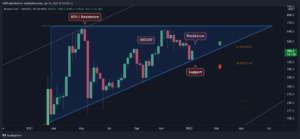The IMF has published a blog post laying out its view on the perceived risks that crypto poses for the global financial system.
The IMF has warned time and time again of the dangers that the cryptocurrency sector poses for the legacy financial system. A recent blog post lays out its perception of how crypto collapses can spread contagion to banks and other financial institutions.
The blog post begins by stating that crypto “has lost trillions in market value”. At the height of the last crypto bull market the total market cap for crypto attained a value of $2.8 trillion. It is now at just over $1 trillion.
A new asset class is bound to see some volatility, especially given that the lack of regulation in the sector has allowed pump and dumps to thrive.
The IMF blog post also accused Bitcoin of losing money for three quarters of the investors who bought it. However, Bitcoin certainly isn’t a digital asset for quick gains. It is an asset to be held over the long term, and retail investors would do well to be aware of this.
Had an investor held Bitcoin over the past few years then they would certainly have done a huge amount better than holding fiat currency in any bank or savings account.
Up until the last ten years in the traditional markets it was customary to see four-year boom and bust cycles, which is pretty much what has been seen in crypto in the last 14 years since its inception.
However, massive printing of fiat currency by central banks has propped traditional markets up, not allowing them to fall, and adding gargantuan piles of debt onto the shoulders of taxpayers who will one day have to bail the banks out.
The IMF authors highlight the banks’ exposure to crypto and welcome the Basel recommendations that are about to be voted on by the European Parliament. However, this particular amendment requires banks to hold reserves equal to more than 100% of any crypto-related exposure, and this may have the effect of them not wanting to engage with any digital asset companies.
If the crypto space was honest, it would admit that yes, there is a need for regulations to protect consumers, but only if these regulations are fair and are not designed to suppress crypto so that central banks can force citizens to continue holding fiat currencies that are losing their purchasing power at an ever-increasing rate.
It might be argued that for the next monetary system to survive, it will have to be completely decentralised, managed by code that cannot be tampered with, rather than humans who can manipulate things to their own advantage. The IMF is very likely to disagree.
Disclaimer: This article is provided for informational purposes only. It is not offered or intended to be used as legal, tax, investment, financial, or other advice.





















